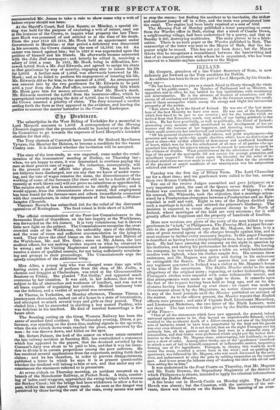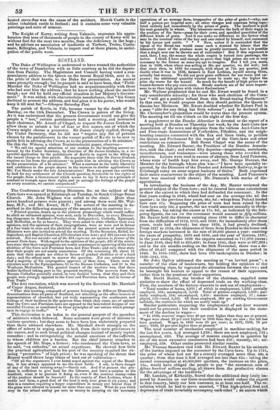IRELAND.
Mr. Gregory, grandson of a late Under Secretary of State, is now definitely put forward as the Tory candidate for Dublin. An address has been forth on the part of Lord Morpeth, by his friends : they say-
" He has been known to you as a stanch friend to liberty through the whole course of his public career. As Member of Parliament and as Minister, in opposition and in office, he has battled for free institutions, with consistency and determination. He is the advocate of freedom of conscience, and the enemy of all exclusion and intolerance. He is the foremost among ;he assail- ants of those monopolies which cramp the energy and blight the commercial prosperity of the nation. "But, above all, he is the friend of Ireland. He was one of the best mem- bers of the best Ministry we have ever seen. He was one of the Executive which first dared to be just to our country ; and for the benefits which we derived from that Executive, much, very much, of our lasting gratitude is due to him. He has been practically, as well as politically, the friend of Ireland; promoting every measure which contributed to the development of her re- sources and the increase of her happiness, and fostering every institution which could accelerate her intellectual and industrial progress. " Of his personal character—his high talents, and great acquirements—his generous and manly spirit—his ample charities, which knew no distinction of creed or class—his cordial affability of demeanour and unaffected kindliness of heart, which won for him the attachment of all men of all parties who ap- proached him during his sojourn among us—it cannot be necessary to speak to the citizens of Dublin. What establishment for the alleviation of the suffer- ings of the poor of the metropolis did not receive his prompt protection and munificent support ? What claim upon his liberality for the relief of in- dividual misfortune was ever made in vain ? To what effort for the elevation of the physical or moral condition of one countrymen was his cooperation solicited and refused ? "
Tuesday was the first day of Hilary Term. The Lord Chancellor sat for a short time ; and ten gentlemen were called to the bar, among them two Roman Catholics.
Ten out of the twelve Judges assembled and gave judgment on a very important point, the case of the Queen versus Smith. The de- fendant was convicted at the last Armagh Assizes of bigamy ; when his counsel, Mr. Whiteside, took the objection, that a marriage solem- nized by a Presbyterian clergyman between a Presbyterian and an Epis- copalian is null and void. Eight to two of the Judges decided that such a marriage is invalid, and ordered the prisoner's discharge. The decision is expected to create the greatest dismay in the North of' Ireland, where marriages of the kind are very common ; for it will greatly affect the happiness and the property of hundreds of families.
More new versions are given of the story of the man killed by some gentlemen in "a lark," at Philipstown. The Evening Mail, a paper favour- able to the parties implicated, says that Mr. Magann, the host, is in a state of great mental agony at the charges brought against him, and is most anxious to further every necessary inquiry. In this paper Flanagan is described as having been a sharp intelligent man, but a sort of mounte- bank. He had been amusing the company on the night in question by his drolleries, and during his performance he drank freely. On leaving the company, he was seen leaning upon a table on which bedchamber- candles were lighted, when his clothes caught fire. His screams drew assistance, and Mr. Magann was active and daring in his endeavour to extinguish the flames. The Mail asserts that not one officer of any regiment quartered in Ireland was a visiter at Mr. Magann's house at the time of the occurrence. The Dublin Monitor sticks to the main allegations of the original story ; repeating, or rather insinuating, that Flanagan's clothes were smeared with some inflammable matter, and that arrangements were made to set light to them. It remarks upon the fact of the inquest having been held so long ago, and on its dis- closures having been hushed up ever since : no report was made to Government about it by the Magistrate, no notice whatever appeared in any of the local journals until the Monitor published an account of the matter. As to the officers present, the Monitor repeats that English officers were present ; and asks if Captain Duff, Lieutenant Macartney, and Lieutenant Nicholson, the two latter of the Ninth Lancers, were not there ? The last version is that given by the Dublin correspondent of the Times- " Out of all the statements which have now appeared, the general, indeed universal opinion seems to be, that beyond an unpardonable debauch, which resulted in the accidental death of a fellow-creature, not one of the frightful acts of barbarity stated to have been perpetrated by the host and his guests was ever even dreamt of. It is not denied, that on the night Flanagan met his untimely fate, all the parties except the host were in a shameful state of intoxication, and that frolics were performed which might put the veriest Bed- lamites to the blush; Mr. Magann alone endeavouring, but fruitlessly, to pre- serve a show of order. Among other freaks, one of the ' gentlemen' contrived to attach a sort of tail to himself, composed of inflammable matter, turpentine forming one of the ingredients. Flanagan, in chasing this would-be devil round the room, received a severe burn in the wrist ; and on quitting the apartment, was followed by Mr. Magann, who was much distressed by the acci- dent, and endeavoured to allay the pain by rubbing turpentine on the injured part. And hence arose the hideous story of daubing the idiot with oil-tar and then setting fire to him." It was understood in the Four Courts on Thursday, that Mr. Magann and Mr. Neale Browne, the Stipendiary Magistrate of the district in which Philipstown is situate, intended to apply for criminal informations against the Dublin Monitor.
A fire broke out in Howth Castle on Monday night. The Earl of Howth was absent • but the Countess, with the assistance of the ser- vants, threw wet blankets on the flames. The bursting of an over- heated stove-flue was the cause of the accident. Howth Castle is the oldest inhabited castle in Ireland; and it contains some very valuable paintings and snits of armour.
The Knight of Kerry, writing from Valencia, expresses his appre- hension that tens of thousands of people in the county of Kerry will be without fuel for the next two months, from the deficiency in the bogs ; and he advises an association of landlords at Tarbert, Tralee, Castle- main, Kikirglan, and Valencia, to import coal at these places, in antici- pation of the public want.



























 Previous page
Previous page